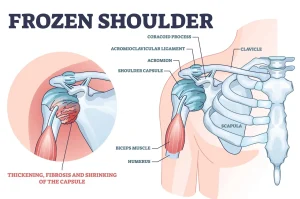Overview
Diagnosis
Frozen shoulder is typically diagnosed based on your symptoms and a physical exam. During the exam, a healthcare provider may ask you to move your arm in specific directions to evaluate pain levels and how far you can move your arm. This is called an active range of motion test.
Next, the provider may move your arm for you while your muscles are relaxed. This is known as passive range of motion. Frozen shoulder affects both active and passive movement, which helps confirm the diagnosis.
In most cases, frozen shoulder can be diagnosed through symptoms and physical examination alone. However, imaging tests may be used to rule out other possible causes of shoulder pain or stiffness, such as arthritis or rotator cuff injuries. These may include:
-
X-rays
-
Ultrasound
-
MRI scans
Treatment
Treatment for frozen shoulder focuses on relieving pain and restoring movement in the shoulder. Most people recover gradually, although full recovery can take up to 12 to 18 months.
Medications
Over-the-counter pain relievers can help reduce pain and inflammation, such as:
-
Aspirin
-
Ibuprofen (Advil, Motrin IB, others)
For more severe pain, your healthcare provider may prescribe stronger anti-inflammatory or pain-relieving medications.
Therapy
Physical therapy plays a key role in recovery. A physical therapist can guide you through range-of-motion exercises designed to stretch the joint capsule and restore movement. Staying consistent with these exercises at home is essential for regaining shoulder flexibility and function.
Surgical and Other Procedures
If symptoms are severe or do not improve with therapy and medication, additional treatments may be recommended, such as:
-
Steroid injections: Corticosteroids injected into the shoulder joint can help reduce inflammation and pain, especially in the early stages.
-
Hydrodilatation: In this procedure, sterile water is injected into the shoulder joint capsule to stretch the tissue, sometimes combined with a steroid injection.
-
Shoulder manipulation: While under general anesthesia, the healthcare provider moves the shoulder joint in various directions to loosen tight tissues and improve mobility.
-
Surgery: If other treatments fail, arthroscopic surgery may be used to remove scar tissue inside the shoulder joint. This minimally invasive surgery uses small incisions and specialized instruments for precise treatment.
With proper care and patience, most people with frozen shoulder regain nearly full motion and function of the affected shoulder over time.
Advertisement

